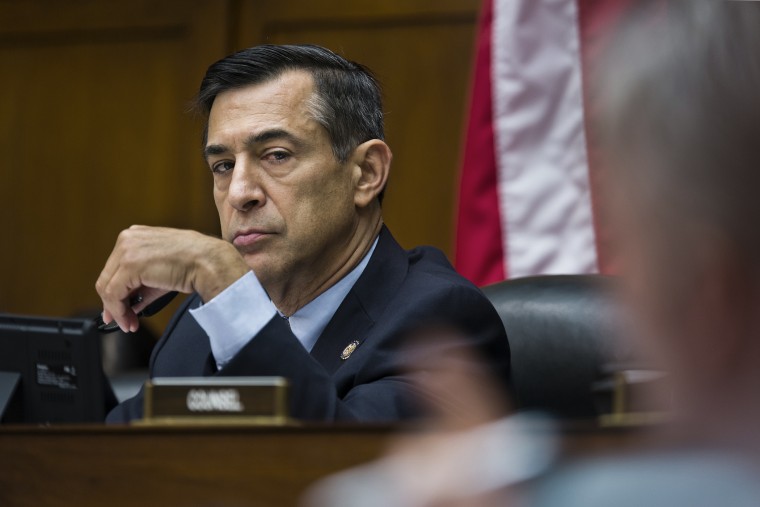One my favorite congressional races of 2016 was in southern California, where Rep. Darrell Issa (R-Calif.) was so worried about his re-election that he sent out direct-mail ads suggesting he’d worked cooperatively with Barack Obama -- whose presidency he fruitlessly tried to tear down.
As regular readers may recall, Issa prevailed in that contest, but it proved to be the closest congressional race of the cycle: the conservative incumbent eked out a narrow win over Doug Applegate (D), a retired Marine colonel. (Issa later filed a ridiculous defamation lawsuit against Applegate, which didn't work out well for the Republican.)
It didn't take long for Democrats to target Issa as one of Congress' most vulnerable Republicans in 2018. As it turns out, the incumbent has seen the writing on the wall: Issa announced this morning that he's retiring this year after nearly two decades on Capitol Hill.
And while plenty of this year's GOP retirements are in districts that lean heavily to the right, that's not the case with Issa.
Hillary Clinton won Issa's 49th Congressional District in 2016 by over seven percentage points against Donald Trump even though Mitt Romney beat Barack Obama there by a similar margin in 2012.Orange County was once a fabled Republican stronghold, but Clinton became the first Democrat to win the affluent area since the Great Depression as it veered away from Trump.
This, coupled with the prevailing political winds, which appear to be blowing at Democrats' backs, left Issa with two unwelcome options: retire or lose. He chose the former.
But the bigger picture extends well beyond one vulnerable incumbent who's exiting the stage. Issa's retirement is emblematic of a larger Republican problem: as GOP lawmakers cancel their re-election plans, the odds of a new Democratic majority improve considerably. Relying on NBC News' data, let's look at the retirement announcements by breaking them up into groups:
Members who are leaving elected office: 24 House incumbents, which includes 18 Republicans and 6 Democrats
Members who are giving up their House seats to run for higher office: 19 House incumbents, which includes 11 Republicans and 8 Democrats
Now, in order for Democrats to take back the House majority, they'll probably need a net gain of 24 seats (I say "probably" because there are some special elections coming up that might affect the arithmetic a bit.) How do the retirements change our expectations? Quite a bit.
It's true, of course, that not all retirements should be treated equally when thinking about partisan control. If a member is stepping down in a district that heavily favors the incumbent's party, it's unlikely that seat will be flipped. But taking a closer look at the 2018 retirements, we see several districts -- Florida's 27th, Washington's 8th, Pennsylvania's 15th, Michigan's 11th, New Jersey's 2nd, California's 39th, and California's 49th -- where a Republican is retiring in districts Hillary Clinton won in 2016. (This will include Arizona's 2nd after Martha McSally launches her Senate campaign later this week.)
They are, in other words, key Democratic pick-up opportunities.
But that's where the list starts, not ends, for Dems. There are other districts, including New Mexico's 2nd, where a Republican is giving up a seat in an area that's likely to be quite competitive. This may include, by the way, House Speaker Paul Ryan's (R) district in Wisconsin, if the GOP leader retires. as I suspect he will.
And then there are many more districts that are likely to become competitive given the Democrats' advantage on the generic congressional ballot.
If Republican officials aren't feeling nervous, they're not paying close enough attention.
Postscript: I imagine right about now you're asking about historical context. That gets a little tricky because of the difference between counting those who retire from public office vs. those who give up their House seat to run for higher office, but FiveThirtyEight published a helpful item last year on the number of "pure" retirements going back to the Watergate era.
The data for 2018 is out of date in the report, but it's still a useful guide.
